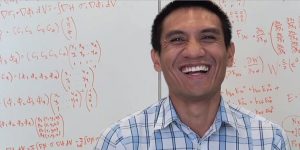AMS Area of Concentration in CM
 Computational Medicine is a discipline in which mechanistic models of disease are developed, personalized using patient data, and applied to improve disease diagnosis and treatment. The Department of Applied Mathematics and Statistics (AMS) offers a PhD Area of Concentration (AOC) in Computational Medicine.
Computational Medicine is a discipline in which mechanistic models of disease are developed, personalized using patient data, and applied to improve disease diagnosis and treatment. The Department of Applied Mathematics and Statistics (AMS) offers a PhD Area of Concentration (AOC) in Computational Medicine.
The three tracks in this AOC are:
- Computational Anatomy is the mathematical and computational discipline of how to describe anatomic shape and function, as measured using medical imaging techniques and their variations in health and disease. It is a discipline which is poised to have a profound impact on many different areas of medicine by enabling discovery of anatomic biomarkers that are highly predictive of disease.
- Computational Molecular Medicine addresses the problems of how to identify the structure of molecular networks, how to model their dynamics, how network properties are altered in disease, and how this knowledge may be applied to improve disease diagnosis and treatment.
- Computational Physiological Medicine develops integrative models of disease that span multiple levels of biological organization. Models are used to understand disease mechanisms and test in silico approaches for treating disease. The ultimate goal is to personalize these models using patient data and then apply them to deliver improved healthcare.
The AMS AOC in Computational Medicine is directed by Dr. Donald Geman. Dr. Geman is Professor of Applied Mathematics and Statistics and is a Core Faculty member of the Institute for Computational Medicine.
-
PhD students concentrating in Computational Medicine must matriculate through a degree-granting program at Johns Hopkins University. They must elect to pursue research with an ICM Core Faculty member having training privileges within that degree-granting program.
Students will need to meet all requirements of their “home” degree-granting program. Students will elect to pursue one of the three tracks described above, selecting an ICM Core Faculty member within that track as the research mentor (in addition to an advisor from the home program). Students will be expected to select a minimum of seven courses from the curriculum described below, thus meeting the Maryland Higher Education Commission (MHEC) requirement that an area of concentration provide at least 18 credit hours of focused class instruction at the PhD level, and pursue research with an ICM Core Faculty member leading to the PhD degree.
-
- William S Anderson, Associate Professor, Dept. of Neurosurgery
- Siamak Ardekani, Assistant Research Professor, Dept. of Biomedical Engineering
- Joel Bader, Associate Professor, Dept. of Biomedical Engineering
- Patrick Barta, Research Associate Professor, Dept. of Biomedical Engineering
- Nicholas Charon, Assistant Professor, Dept. of Applied Mathematics & Statistics
- Joshua Epstein, Professor of Emergency Medicine, School of Medicine
- Donald Geman, Professor, Dept. of Applied Mathematics and Statistics
- Rachel Karchin, Assistant Professor, Dept. of Biomedical Engineering
- Feilim Mac Gabhann, Assistant Professor Biomedical Engineering
- Michael I. Miller, Hershel and Ruth Seder Professor, Dept. of Biomedical Engineering
- Rajat Mittal, Professor, Dept. of Mechanical Engineering
- Tilak Ratnanather, Associate Research Professor, Dept. of Biomedical Engineering
- Suchi Saria, Assistant Professor, Dept. of Computer Science
- Sridevi Sarma, Assistant Professor, Dept. of Biomedical Engineering
- Natalia Trayanova, Murray B. Sachs Professor, Dept. of Biomedical Engineering
- Rene Vidal, Assistant Professor, Dept. of Biomedical Engineering
- Joshua Vogelstein, Assistant Professor, Dept. of Biomedical Engineering
- Raimond Winslow, Raj and Neera Singh Professor, Dept. of Biomedical Engineering
- Laurent Younes, Professor and Chair, Dept. of Applied Mathematics and Statistics
-
- Introduction to Computational Medicine I (EN.580.631)
- Foundations of Computational Biology & Bioinformatics II (EN.580.688) or Computational Molecular Medicine (EN.553.650)
-
(pick 2 or more courses)
Dynamical Systems
520.601 Introduction to Linear Dynamical Systems (3 cr)
520.621 Introduction to Nonlinear Systems (3 cr)
Statistics and Machine Learning
550.430/630 Statistical Theory (choice depends on student qualifications) (4 cr)
550.437/640 Machine Learning (choice depends on student qualifications) (3 cr)
Computational Methods
530.766 Numerical Analysis (3 cr)
530.639 Scientific Computing (3 cr)
-
Click here to view a PDF of the Research Area Core Requirements.
-
Electives (non-limiting list; electives may be chosen from courses offered by the JHU Schools of Medicine, Engineering, Public Health and Arts and Sciences with advisor approval)
Dynamical Systems
- 520.614 Linear System Theory (3 cr)
- 550.391 Dynamical Systems (3 cr)
- 580.651 Introduction to Nonlinear Dynamics in Physiology (3 cr)
Calculus of variations
- 520.630 Introduction to the Calculus of Variations and Optimal Control (3 cr)
- 110.427 Introduction to the Calculus of Variations (4 cr)
- 550.493 Mathematical Image Analysis (3 cr)
Statistics and Machine Learning
- 520.651 Random Signal Analysis (3 cr)
- 520.614 Introduction to Information Theory and Coding (3 cr)
- 550.426 Introduction to Stochastic Processes (4 cr)
- 550.436 Data Mining (4 cr)
- 580.466 Statistical Methods in Imaging (3 cr)
- 580.692 Learning Theory II (3 cr)
- 600.774 Kernel Machine Learning (3cr)
Quantitative Life Sciences
- 580.421 Systems Bioengineering I (Cardiovascular System) (4 cr)
- 580.422 Systems Bioengineering II (Nervous System) (4 cr)
- 580.423 Systems Bioengineering III (Systems Biology) (2 cr)


